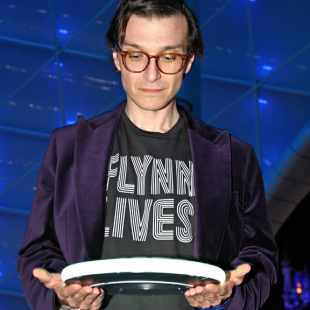Art, on its most basic level, is extremely subjective. You could put a Jackson Pollock on display in a crowded train station, and get just as many unique opinions as you would viewers. What ultimately separates art from anti-art is, basically, its approach. Take, for instance, the Netflix film Velvet Buzzsaw, a film that would love if you called it art, thank you very much. But is it really art? Well, to invoke an age-old saying, you might not know art, but you'll definitely know if you like this film or not.
Set in the world of modern art, Velvet Buzzsaw shows the darker side of the medium through the interactions of various characters and the art of a recently deceased man. One woman (Zawe Ashton) discovers him and makes her career by doing so, another (Rene Russo) wants to profit off of him to the extreme, and connecting them is an art critic (Jake Gyllenhaal) who could make both of their dreams come true. Their interactions with a varied cast of characters will show what happens when the true nature of the art they're displaying reveals itself in a most deadly manner.
Velvet Buzzsaw has some interesting, if not totally original, ideas it wants to get across to its viewers. After all, the world of high art has always been open for parody, and this isn't the first film to realize this fact. Unfortunately, it's not even one of the better examples of such a concept, as it focuses so much time trying to say something unique about greed and art's contemptuous marriage that it instead ends up saying most of the things we've already heard on the subject.
Writer / director Dan Gilroy feels like he wanted to create a season's worth of horror anthology TV, crossed with a biting satire highlighting the fickle nature of the art world and its critics. This is fine if you have a clear, singular vision for what you want to do, but Gilroy's Velvet Buzzsaw is as effective at cutting down to a clear intent as its titular implement would be at cutting wood.
This film not only doesn't lean into the horror angle enough to tell at the very least a standard tale of crime and punishment, it also doesn't push the satire angle hard enough to get an effective reaction. Just when you start to forget it's supposed to be a horror film, Velvet Buzzsaw will deliver a kill on a scare that's supposed to remind you of that fact, but only does so in the most nominal fashion.
That's not to say that there aren't moments that are entertaining, or performances unworthy of attention in Velvet Buzzsaw. As per usual, Jake Gyllenhaal is allowed to turn on his crazy charm, and much like their last pairing, Nightcrawler, Gyllenhaal gets some quality moments of madness that are too good to forget. The memes will come a calling, most assuredly. The downside to this is the fact that Gyllenhaal's co-stars aren't given as much gleeful insanity to tear into themselves.
While Gyllenhaal is an appreciated part of the trio that make up the heart of Velvet Buzzsaw's story, it's Zawe Ashton's Josephina and Rene Russo's Rhodora that are the big players in this world. They should be carrying this film as leads, but instead feel more like supporting characters in their own story, which feels like a film that’s mostly separated from whatever antics Jake Gyllenhaal is going through.
If these two ideas were split into their own films, we might have had a cycle of films that delivered a 1,2 satirical punch to the practice of modern art. But with Velvet Buzzsaw combining these stories without much cohesion, or even development, both halves lose out. And this is already on top of a film that has so many supporting characters, it just further supports the two film approach being the correct option.
If there is any sort of clear message that shines through Velvet Buzzsaw’s murky whole, it's that Dan Gilroy is tired of making movies for Hollywood, and ready to make them for himself. In fact, that feels like the explicit purpose of John Malkovich's character, as he’s basically a stand in for Gilroy to deliver that message to the audience. And it would have worked, if it wasn’t for the fact that this character could be totally removed from the film, and have no effect on the story whatsoever.
Gilroy’s message in Velvet Buzzsaw is a whisper in a crowded room, where one half of the crowd is trying to tell a joke, the other is trying to tell a spooky story, and one person is in the middle of the room whispering “Fuck you” to any who challenge them. That message could have been the bridge between the two separate movies this film wants to be, but those halves don't connect adequately to make it a complete work.
All the raw materials are there to deliver a visceral experience that could have been something worth talking about, but there’s no substance to anchor them down. You can’t be mad at Velvet Buzzsaw, as all involved are clearly talented, and there’s a level of promise in what it’s trying to do. You sure as hell can be disappointed though, as it’s a bloody waste of a good time.

Mike Reyes is the Senior Movie Contributor at CinemaBlend, though that title’s more of a guideline really. Passionate about entertainment since grade school, the movies have always held a special place in his life, which explains his current occupation. Mike graduated from Drew University with a Bachelor’s Degree in Political Science, but swore off of running for public office a long time ago. Mike's expertise ranges from James Bond to everything Alita, making for a brilliantly eclectic resume. He fights for the user.











